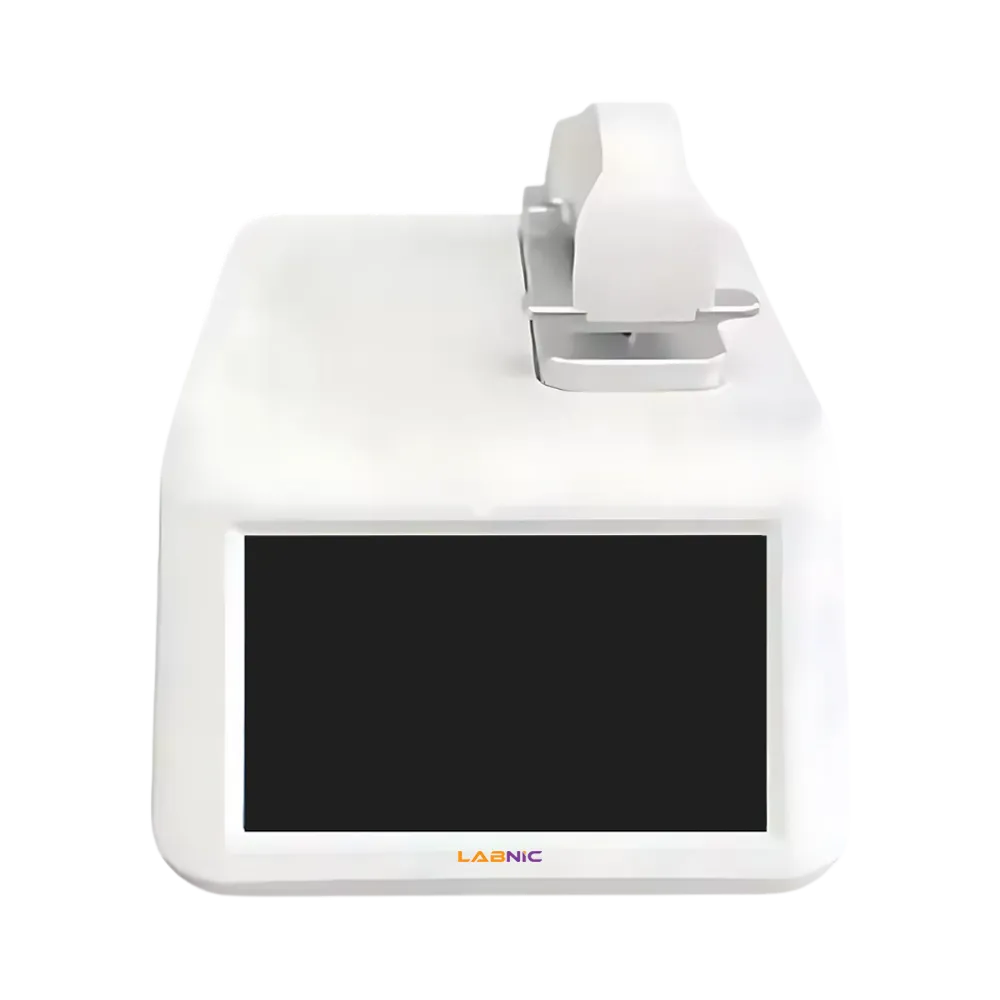
Micro Spectrophotometer LBN-MS162 is designed with a full spectrum wavelength range of 180 to 910nm. It requires only 0.5 to 2 µl of sample, allows recovery after testing, and delivers fast results within 2 to 6 seconds. Equipped with a long life xenon flash lamp and delivers high absorbance detection repeatability without preheating. Integrated 7-inch touch screen with multi touch and USB export enables efficient operation and data management. Our Micro Spectrophotometer is ideal for molecular biology, biotechnology, and clinical research applications.
| Optical Path | 0.2mm, 1.0mm, 1.2mm |
| Wavelength Scanning Range | 180 to 910nm |
| Wavelength Accuracy | ±1nm |
| Wavelength Resolution | ≤ 1.5 nm |
| Wavelength Precision | ±0.2nm |
| Sample Volume | 0.5 to 2.0μl |
| Absorbance Range | ±1nm |
| Absorbance Accuracy | ±0.2nm |
| Absorbance Precision | 0.002Abs |
| Nucleic Acid Range |
dsDN:2 to 4500ng/μL ssDNA:1.32 to 2970ng/μL RNA:1.6 to 3600ng/μL |
| Protein Range |
A280:0.04 to 750mg/ml BSA: 0.06 to 1119mg/ml |
| Sample Pedestal Material | 304 Stainless Steel and Quartz Fiber |
| Light Source | Xenon Flash Lamp |
| Detector | 2048 -Element Linear CMOS Array |
| Detection Time | Less Than 6S |
| Data Export | USB |
| Power Consumption | 48W |
| Power Supply | 12V 4A |
| Dimension | 270 × 210 × 196 mm |
| Weight | 3.3 kg |
Micro Spectrophotometer LBN-MS162 is used in laboratory, food industries, chemistry, microbiology, medicine research and development.
Micro Spectrophotometer LBN-MS162 is used in laboratory, food industries, chemistry, microbiology, medicine research and development.
Most Frequently Asked Questions
1. What is a micro spectrophotometer?
Ans. A microspectrophotometer is an instrument that combines a microscope and a spectrophotometer to analyze the optical properties of microscopic samples. It measures absorbance, reflectance, or fluorescence from very small sample areas.
2. What are the applications of a micro spectrophotometer?
Ans. It is used in materials science, biology, chemistry, and forensic analysis to study pigments, coatings, biomolecules, and thin films. It helps identify and quantify substances in microscopic samples.
3. What types of samples can be analyzed using a micro spectrophotometer?
Ans. It can analyze biological cells, tissues, DNA, thin films, and industrial materials. The instrument is useful for studying samples that are too small for conventional spectrophotometry.
4. What is the principle behind micro spectrophotometry?
Ans. The principle is based on the absorption, transmission, or reflection of light by a sample at different wavelengths. By analyzing this interaction, the instrument provides detailed spectral data about the sample.
5. What wavelength range does a microspectrophotometer cover?
Ans. Most models cover ultraviolet (UV), visible (VIS), and near-infrared (NIR) wavelengths, typically ranging from 200 nm to 1000 nm. This allows for versatile spectral analysis.
Micro Spectrophotometer LBN-MS162 is designed with a full spectrum wavelength range of 180 to 910nm. It requires only 0.5 to 2 µl of sample, allows recovery after testing, and delivers fast results within 2 to 6 seconds. Equipped with a long life xenon flash lamp and delivers high absorbance detection repeatability without preheating. Integrated 7-inch touch screen with multi touch and USB export enables efficient operation and data management. Our Micro Spectrophotometer is ideal for molecular biology, biotechnology, and clinical research applications.